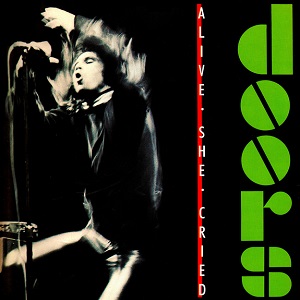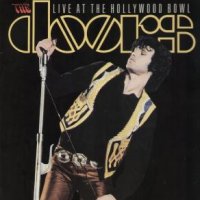
The Doors were an American rock band formed in Los Angeles in 1965, with vocalist Jim Morrison, keyboardist Ray Manzarek, guitarist Robby Krieger and drummer John Densmore. They were among the most influential and controversial rock acts of the 1960s, primarily due to Morrison's lyrics and voice, along with his erratic stage persona and legal issues. The group is widely regarded as an important figure of the era's counterculture.

L.A. Woman is the sixth studio album by the American rock band the Doors, released on April 19, 1971 by Elektra Records. It is the last to feature lead singer Jim Morrison during his lifetime, due to his death exactly two months and two weeks following the album's release, though he would posthumously appear on the 1978 album An American Prayer. Even more so than its predecessors, the album is heavily influenced by blues. It was recorded without producer Paul A. Rothchild after he quit the band over the perceived lack of quality in their studio performances. Subsequently, the band co-produced the album with longtime sound engineer Bruce Botnick.

"Moonlight Drive" is a song by American rock band the Doors, released in 1967 on their second album Strange Days. It was edited to a 2:16 length for the 45 rpm single B-side of "Love Me Two Times". Though a conventional blues arrangement, the track's defining feature was its slightly off-beat rhythm, and Robby Krieger's "bottleneck" or slide guitar, which creates an eerie sound.

The Doors is a 1991 American biographical film directed by Oliver Stone and written by Stone and Randall Jahnson. It is based on the history of American rock band the Doors and their influence on music and counterculture. The film stars Val Kilmer as singer Jim Morrison, Meg Ryan as Morrison's girlfriend Pamela Courson, Kyle MacLachlan as keyboardist Ray Manzarek, Frank Whaley as lead guitarist Robby Krieger, Kevin Dillon as drummer John Densmore, Billy Idol as Cat and Kathleen Quinlan as journalist Patricia Kennealy.

Absolutely Live is the first live album by the American rock band the Doors, released on July 20, 1970, by Elektra Records. The double album features songs recorded at concerts held in 1969 and 1970 in several U.S. cities. It includes the first full release of the performance piece "Celebration of the Lizard" and several other tracks that had not previously appeared on any official Doors release. The album peaked at number eight on the Billboard 200 in September 1970.

Pamela Susan Courson was the long-term companion of Jim Morrison, singer of the Doors. Courson stated she discovered Morrison's body in the bathtub of a Paris apartment in 1971. She died three years after him, in 1974. She was later legally recognized as his common-law wife.

No One Here Gets Out Alive was the first biography about the lead singer and lyricist of the rock band the Doors, Jim Morrison, published in 1980. Its title is taken from a line in the Doors' song "Five to One", and the book is divided into three sections: The Bow is Drawn, The Arrow Flies and The Arrow Falls, for the early years of Morrison's life, his rise to fame with the Doors, and then his final years and death. The book was written by Jerry Hopkins and Danny Sugerman.

13 is the first compilation album by American rock band the Doors, released by Elektra Records on November 30, 1970. The title refers to the thirteen tracks included, which feature a variety of songs from their five studio albums released up to that point. The cover shrink wrap featured a clear sticker that read: "A Collection of Thirteen Classic Doors Songs". It is the band's only compilation album released while lead singer Jim Morrison was alive.

Alive, She Cried is the second official live album by the American rock band the Doors, released in October 1983 by Elektra Records. It is the follow-up to the 1970's Absolutely Live, produced by Paul A. Rothchild. The album's title was taken from a line in the song "When the Music's Over".

Live at the Hollywood Bowl is the third official live album by the American rock band the Doors, released in May 1987 by Elektra Records. The concert was recorded on July 5, 1968, at the Hollywood Bowl in Los Angeles, the Doors' hometown.
"Strange Days" is a song by the Doors, released in 1967 as the opening track on the album of the same name. Along with other album tracks, it was composed before the date it was recorded; a live performance recorded in May 1966 was captured on the 2016 album London Fog 1966. The track is also recognised as one of the earliest showcases for the use of the Moog synthesizer.

"The Unknown Soldier" is the first single from the Doors' 1968 album Waiting for the Sun, released in March of that year by Elektra Records. An accompanying 16mm publicity film for the song featuring the band was directed and produced by Edward Dephoure and Mark Abramson. The song became the band's fourth Top 40 hit in the US, peaking at number 39 on the Billboard Hot 100, and remained upon the Billboard Hot 100 list for eight weeks.
"The Soft Parade" is a song composed by the American rock group the Doors, though credited to lead singer Jim Morrison only. It was recorded for their fourth studio album, also titled The Soft Parade (1969), appearing as the closing track. It has been considered as one of the most musically diverse compositions by the band.

James Douglas Morrison was an American singer, songwriter and poet who was the lead vocalist and primary lyricist of the rock band the Doors. Due to his energetic persona, poetic lyrics, distinctive voice, erratic and unpredictable performances, along with the dramatic circumstances surrounding his life and early death, Morrison is regarded by music critics and fans as one of the most influential frontmen in rock history. Since his death, his fame has endured as one of popular culture's top rebellious and oft-displayed icons, representing the generation gap and youth counterculture.

No One Here Gets Out Alive is a box set by the band The Doors, released in 2001.

The Doors Collection is a music compilation by the American rock band the Doors, released on Laserdisc and DVD in 1995 and 1999, respectively. It compiles three films previously released by MCA/Universal Home Video: Dance on Fire (1985), Live at the Hollywood Bowl (1987) and The Soft Parade – A Retrospective (1991).
Feast of Friends is a 1969 documentary film about the American rock band the Doors. It was directed by Paul Ferrara, Babe Hill and the Doors. Ferrara followed the Doors between April and September 1968, filming excerpts of concert performances, conversations between the band and the band relaxing backstage. Hill recorded the audio using a portable Nagra recorder.
The Doors Are Open is a 1968 black-and-white documentary about the American rock group the Doors. It was produced by Jo Durden-Smith for Granada TV and directed by John Sheppard and first aired in the United Kingdom on 4 October 1968. The programme combines footage of the Doors playing live at London's Roundhouse venue, interviews with the band members and contemporary news snippets of world current affairs - protests at the 1968 Democratic Convention, French riots, statements from politicians and footage of the Vietnam War etc.

Live at the Isle of Wight Festival 1970 is a live album by the American rock band the Doors, released on February 23, 2018, on Rhino Records. The concert was recorded at the Isle of Wight Festival in England on August 30, 1970, and this was released by Eagle Rock Entertainment. It was the group's final appearance as a foursome outside of the US and also the last full filming of a Doors concert.
R-Evolution is a 2013 music documentary featuring 19 live performances, TV performances and music videos by American rock band the Doors. The compilation features TV performances not previously released as well as original music videos from the 1960s, the 1980s and the 1990s. All archive footage was digitally restored and the sound was remixed and mastered for 5.1 by Bruce Botnick. It was released by Eagle Rock on November 25, 2013.














